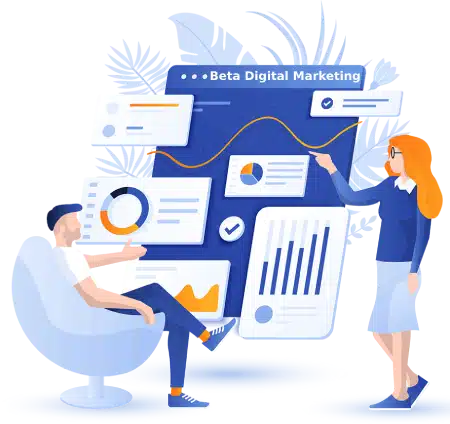The Transformative Impact of Digital Marketing in Higher Education:
In the rapidly evolving landscape of Digital marketing for higher education has emerged as a pivotal force, reshaping how institutions connect with prospective students, engage their audience, and distinguish themselves in a competitive market. This exploration delves into the multifaceted realm of digital marketing for higher education, spotlighting its significance, exploring key strategies, and shedding light on its transformative potential.
I. Introduction: Frontier of Digital marketing for higher education
In the age of information, traditional marketing strategies no longer suffice for Digital marketing for higher education institutions seeking to attract, enroll, and retain students. Digital marketing for higher education has become the cornerstone, offering unparalleled opportunities to connect with a global audience and amplify institutional visibility.
II. Understanding the Landscape: The Dynamics of Digital Marketing for Higher Education
The Digital Canvas of Higher Ed:
- Digital marketing for higher education encompasses a vast array of channels, from social media and content marketing to search engine optimization (SEO) and email campaigns. Institutions must navigate this digital canvas strategically to maximize their reach and impact.
Personalized Connection Points:
- One of the hallmarks of digital marketing for higher education is the ability to create personalized connections. Tailoring content and messages based on individual interests and behaviors fosters a sense of connection, crucial for student recruitment and engagement.
Analytics and Insights:
- Digital marketing for higher education provides institutions with valuable analytics and insights. By leveraging data, higher education marketers can measure campaign effectiveness, understand audience behavior, and make data-driven decisions to enhance their strategies continually.
III. Key Strategies in Digital Marketing for Higher Education
SEO Optimization for Institutional Visibility:
- Effective Search Engine Optimization (SEO) is paramount for higher education institutions. Optimizing website content, implementing strategic keywords, and enhancing the overall online presence contribute to improved visibility in search engine results.
Engaging Content Marketing:
- Content remains king in the digital realm. Crafting engaging and informative content, such as blog posts, articles, and videos, positions Digital marketing for higher education institutions as authoritative sources, attracting and retaining prospective students.
Social Media Storytelling:
- Social media platforms serve as powerful storytelling mediums Digital marketing for higher education. Through compelling narratives, behind-the-scenes glimpses, and student success stories, institutions can foster a vibrant online community and humanize their brand.
Email Campaigns for Targeted Communication:
- Email Digital marketing for higher education institutions to communicate directly with prospective students. Personalized emails, newsletters, and updates can nurture leads, provide valuable information, and guide students through the enrollment journey.
Pay-Per-Click (PPC) Advertising:
IV. The Transformative Impact: Digital Marketing’s Role in Shaping Higher Education
Global Reach and Accessibility:
- Digital marketing for higher education breaks down geographical barriers, enabling higher education institutions to reach a global audience. Prospective students from different corners of the world can explore and engage with institutions without physical constraints.
Enhanced Student Recruitment Strategies:
- Traditional recruitment methods are complemented and enhanced by Digital marketing for higher education. Virtual campus tours, webinars, and interactive content provide prospective students with a comprehensive view of the institution’s offerings.
Brand Differentiation and Positioning:
- In a competitive higher education landscape, Digital marketing for higher education allows institutions to differentiate themselves. Through carefully crafted messaging and branding strategies, institutions can carve out unique identities that resonate with their target audience.
Community Building and Alumni Engagement:
- Digital marketing for higher education facilitates community building among current students and engages alumni effectively. Social media platforms become spaces for networking, collaboration, and ongoing relationships, contributing to a sense of belonging within the institutional community.
Adapting to Changing Student Behaviors:
- Today’s students are digital natives, and their behaviors reflect this. Digital marketing for higher education that embrace digital marketing are better positioned to connect with and understand the preferences of the modern student, adapting their strategies to meet evolving needs.
V. Challenges and Considerations: Navigating the Digital Landscape
Balancing Authenticity with Promotion:
- Maintaining authenticity is crucial in digital marketing for higher education. Striking the right balance between promotional content and genuine storytelling ensures that institutions connect with their audience in an authentic and meaningful way.
Navigating Privacy Concerns:
- Digital marketing for higher education involves collecting and utilizing data, raising privacy concerns. Higher education institutions must navigate these concerns ethically, ensuring compliance with regulations while maintaining transparency with their audience.
Staying Ahead of Technological Advancements:
- The digital landscape evolves rapidly. Digital marketing for higher education marketers must stay abreast of technological advancements, emerging platforms, and changing algorithms to ensure that their strategies remain effective and competitive.
VI. Case Studies: Digital Marketing Success Stories in Higher Education
University X: SEO Strategies for Increased Enrollment
- University X implemented robust SEO strategies, optimizing its website content and utilizing targeted keywords. The result was a significant increase in online visibility, leading to a notable uptick in enrollment applications.
College Y: Social Media Engagement for Community Building
- College Y leveraged social media platforms to foster community engagement. Through interactive campaigns, live events, and alumni spotlights, the institution strengthened its online community and saw increased engagement among current and prospective students.
Institute Z: Email Campaigns for Personalized Communication
- Institute Z implemented targeted email campaigns tailored to different stages of the student journey. The personalized approach resulted in higher open and conversion rates, with prospective students expressing a stronger connection to the institution.
VII. The Future Horizon: Anticipated Trends in Digital Marketing for Higher Education
Virtual Reality (VR) and Augmented Reality (AR) Integration:
- The incorporation of VR and AR technologies in Digital marketing for higher education promises immersive experiences. Virtual campus tours, interactive classrooms, and AR-enhanced informational materials are anticipated to become integral components of higher education marketing.
Chatbots and AI Assistance:
- AI-driven chatbots are expected to play a more prominent role in providing instant assistance to prospective students. Answering queries, guiding through application processes, and offering personalized information contribute to a seamless user experience.
Video Dominance in Content Marketing:
- Video content is projected to dominate content marketing strategies. From virtual events to video testimonials, Digital marketing for higher education institutions will increasingly leverage the visual appeal of video to connect with their audience effectively.
Voice Search Optimization:
- With the rise of voice-activated devices, optimizing content for voice search is becoming imperative. Digital marketing for higher education marketers will need to adapt their strategies to ensure that their institutions remain visible in voice-driven search queries.
Hyper-Personalization:
- As technology advances, hyper-personalization in Digital marketing for higher education will become more prevalent. Tailoring content, messaging, and interactions at an individual level will be instrumental in establishing meaningful connections with prospective students.
VIII. Conclusion: Shaping the Future of Digital marketing for higher education
In the ever-evolving landscape of higher education, Digital marketing for higher education as a transformative force, reshaping how institutions connect with their audience, tell their stories, and adapt to the preferences of the modern student. Digital marketing for higher education continue to navigate the digital frontier, the strategic implementation of digital marketing strategies will be paramount in securing institutional success.
Digital marketing for higher education is not merely a promotional tool; it’s a dynamic and evolving approach that empowers institutions to thrive in the digital age. By embracing authenticity, leveraging the latest technologies, and adapting to emerging trends, higher education institutions can amplify their impact, engage their audience, and remain at the forefront of educational innovation. In this digital era, the transformative potential of digital marketing in higher education is boundless, offering institutions the opportunity to redefine their narratives and shape the future of education.

















